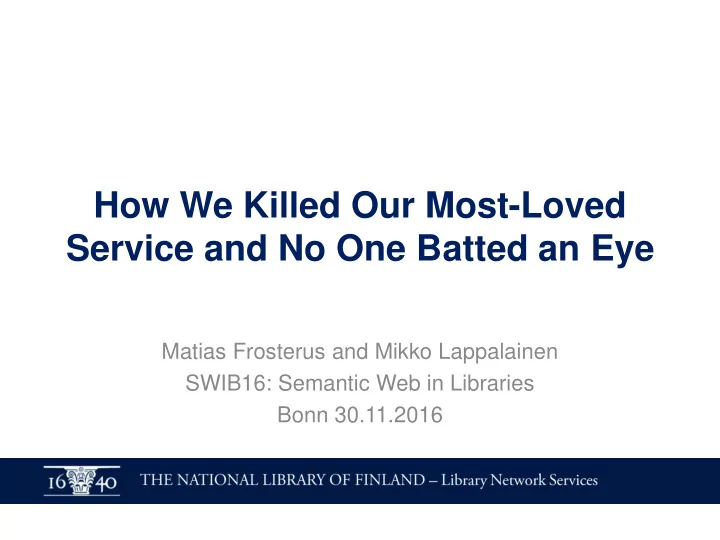

How We Killed Our Most-Loved Service and No One Batted an Eye Matias Frosterus and Mikko Lappalainen SWIB16: Semantic Web in Libraries Bonn 30.11.2016
Replacing a well-loved service First, we did it the wrong way Don’t do it like we did! Then, we did it the right way Do it like we did it!
The General Finnish Thesaurus YSA National Library’s General Finnish thesaurus YSA was/is the most used thesaurus in Finland Developed originally in the 1980’s mainly for book indexing Used in the indexing of the national bibliography Monolingual, has a swedish equivalent Allärs Structure tied to MARC21-format, for example use of MARC- subdivisions
VESA A dedicated site for browsing YSA and its Swedish-language counterpart Allärs Also included the music domain thesaurus MUSA/Cilla
VESA
VESA Built in the 90s Users were very used to it Single-purpose Very functional design Very fast Consistently our most-loved service in user surveys No improvements needed!
VESA Started in 1999 Users were very used to it Single-purpose Very functional design Very fast Consistently our most-loved service in user surveys No improvements needed! Except that there was no proper support for linked data, no APIs in order to integrate the vocabularies into other systems, and the ancient software was more and more difficult to maintain
ONKI A general thesaurus and ontology service Developed in the FinnONTO research project Aalto University and University of Helsinki Several aims Ability to handle moderately complex OWL ontologies as well as thesauri and classifications APIs to allow integration into annotation and search systems Part of the larger national linked data infrastructure From YSA to YSO (General Finnish Ontology) From terms to concepts (identified with URIs) A complete is-a hierarchy Multilingual (Finnish, Swedish, English) Machine-understandable semantics
ONKI1 - 2008
ONKI2 - 2010
ONKI3 - 2011
ONKI – weak points Designed by engineers for engineers The design was refined over the versions to more accommodate the needs of the annotators A research prototype Proof of concept Not very reliable Reliability isn’t important for research Slated to replace VESA in 2011 Pulled back because of user feedback
Finto A project to build a production version of ONKI 2013 -> National Library of Finland Funded by the Ministry of Finance and the Ministry of Culture and Education
Finto - 2013
User groups User Annota- End group : users tors User Annota- End Vocabulary Application groups : developers developers users tors
Design principles Finto must be reliable and fast No extra workload for the annotators A lot of emphasis on usability Tests with professionals Deep collaboration with people with real annotation experience Several people in the project group Active participation in the design Dug up information based on the VESA logs An example finding: many users search for terms with the singular
User testing A limited pool of possible test subjects Professional annotators are not very common Various sub-categories Books vs museum artefacts vs health documents Finnish vs Swedish vs both Annotation as main work vs annotation as auxiliary work Thorough planning When to test? Who to test with?
Test set ups Tests done on the test subject’s own computer in their own office Tasks An ordinary annotation task Using their usual set-up Using Finto A specifically set up annotating a book with key concepts that are not present in the annotation vocabulary as is but that require the use of the search interface Using Finto Recorded Observations Questionnaire General interview
System Usability Scale The System Usability Scale (SUS) provides a light-weight tool for measuring usability Ten questions I think that I would like to use this system frequently. I found the system unnecessarily complex. Etc. Score of 1-100 with 68 being average
Results System ONKI3 Finto Finto Finto test 1 test 2 test 3 Average 48 80 80 76
Patient long-term communication Presentations in various forums Emphasizing the fact that the user should get no extra workload New possibilities and general interoperability with systems outside of the library domain Full support for multilinguality A long countdown to the end Once we were absolutely sure of Finto’s performance
New features Modular design allows for additional features Integration into the Finna search and access service to museum, archive, and library materials Suggestions system for new concepts and changes to existing ones Originally done through email
Suggestions system
Suggestions system A simple web form codifying the necessary fields A star rating for the suggestions – more fields filled, more stars Each suggestion opens an issue in GitHub Allows for commenting on the suggestions Powerful search tools Suggestions also go into a ” suggestions vocabulary ” in Finto where you can use them straight away If the suggestion is accepted into the vocabulary, the URI stays If it is not accepted, the URI is given a dct:isReplacedBy relation to a suitable other concept
Suggestions system Makes the work transparent Makes the suggestions easier to process but also makes sending them more streamlined Loved by the developers
The death of VESA VESA was finally unplugged in the beginning of 2016 Zero negative feedback
Thank you! Questions? matias.frosterus@helsinki.fi finto-posti@helsinki.fi http://finto.fi http://skosmos.org
Recommend
More recommend